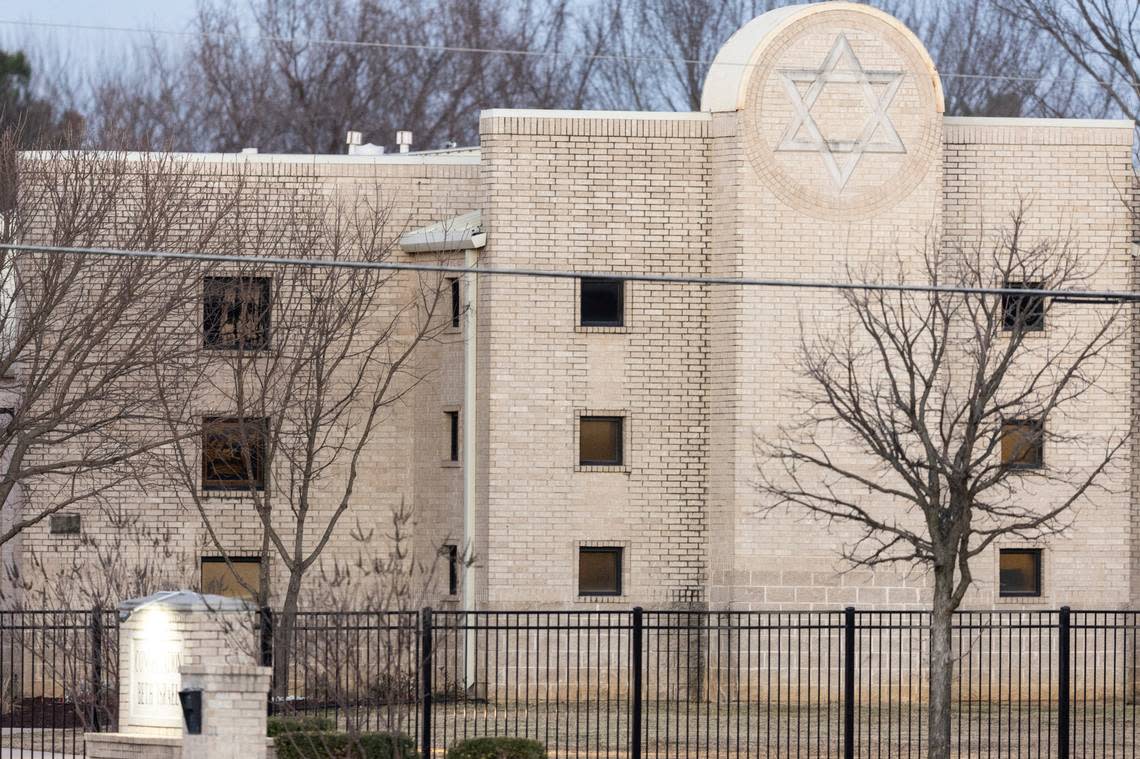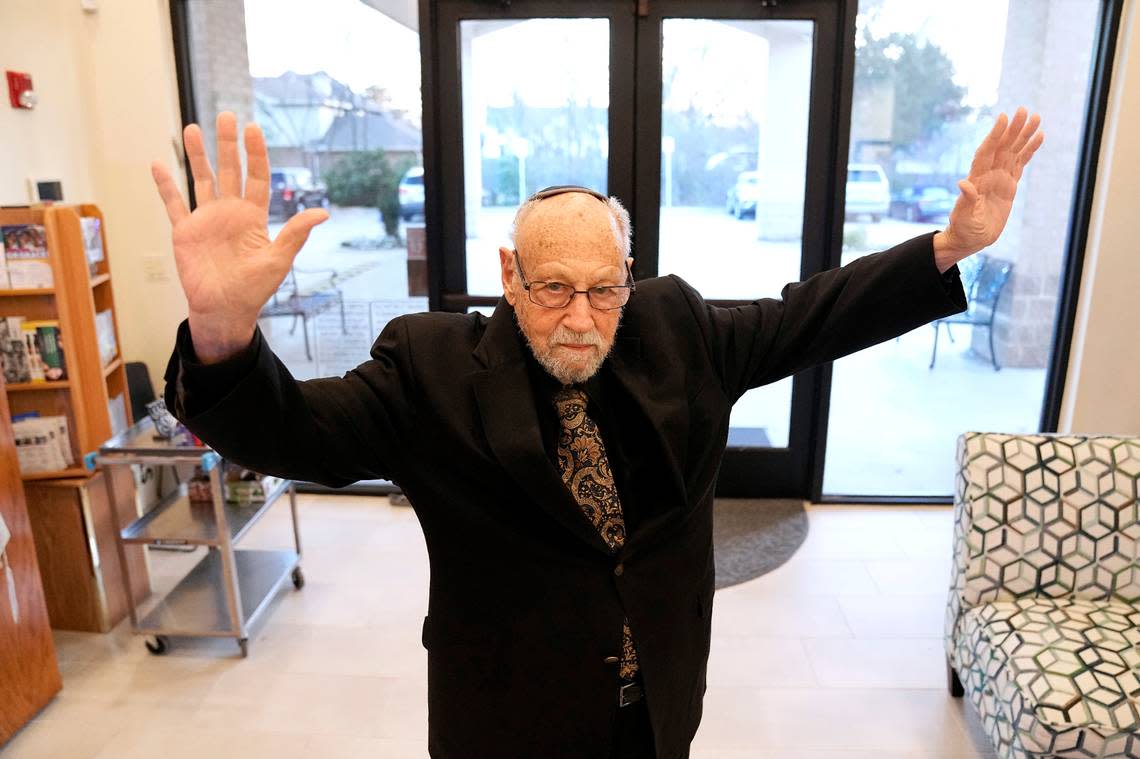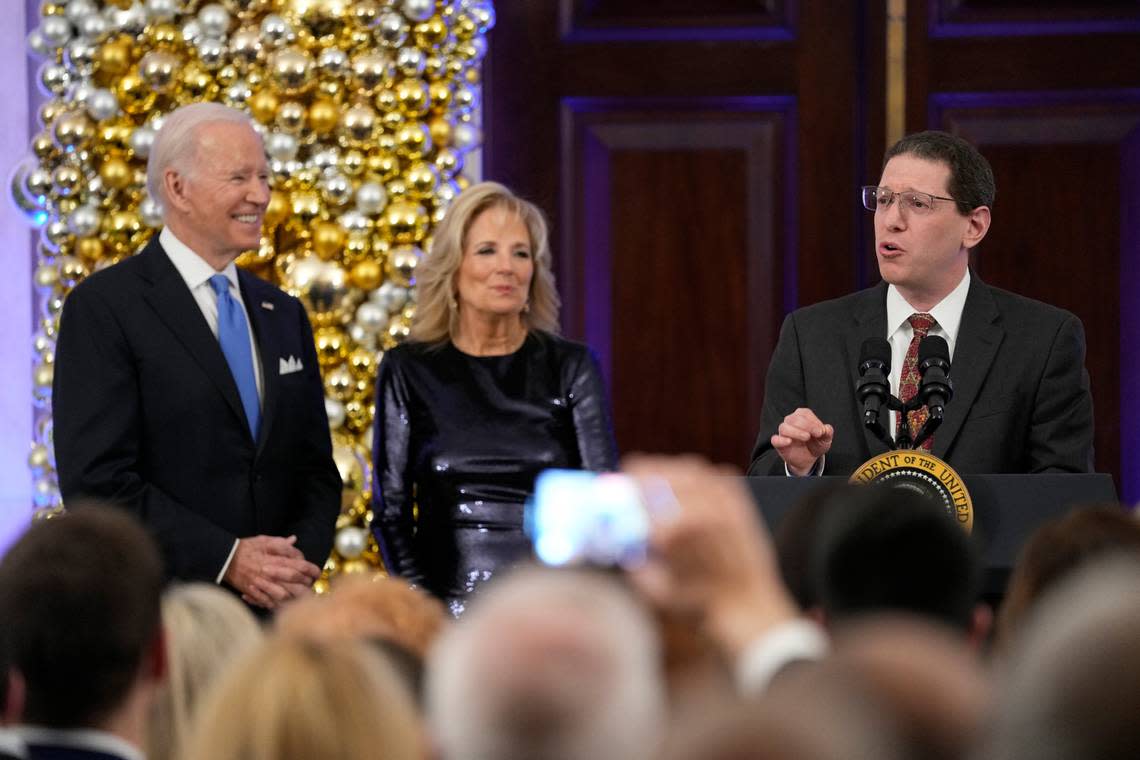‘I’ve got someone who has a gun:’ 911 calls in synagogue hostage crisis reveal unfolding terror
Recordings of 911 calls made during the Colleyville synagogue hostage crisis last Jan. 15 give an inside look into the terror that unfolded that Saturday.
The Shabbat morning service at Congregation Beth Israel began at 10 a.m. as usual. Rabbi Charlie Cytron-Walker, Jeffrey Cohen, Lawrence Schwartz and Shane Woodward were the only members in the building. Due to the cold weather and the COVID-19 pandemic, most of the congregants watched on Zoom or Facebook Live.
As the service progressed, those watching online realized something was wrong.
“Someone is in our synagogue yelling at the rabbi obscenities,” a caller told the 911 dispatcher, according to recordings obtained Friday by the Star-Telegram. The caller later added, “Please get someone there.”
Another 911 caller said she couldn’t see anything on the screen, but she could hear a man making threats.
The man, 44-year-old British citizen Malik Faisal Akram, had knocked on the door of the synagogue earlier that morning. Cytron-Walker invited him in, thinking he needed shelter. After the Amidah — the central prayer of the Jewish liturgy — Akram pulled out a handgun and proceeded to take Cytron-Walker and the other three men hostage. The gunman also falsely claimed to have bombs.
Cytron-Walker, in a 911 call that lasted nearly 1 hour and 40 minutes, started by saying, “I’ve got someone who has a gun and ... he says he has two bombs and he’s asking police to move back.”
A couple of minutes later the rabbi asked the dispatcher if the police had moved back.
“He says that he will pull the bomb if they don’t pull back,” Cytron-Walker said.
About seven minutes into the call, Akram got on the phone with the dispatcher. “Everything will be fine,” he told her. When she asked him about his claim that he had bombs, Akram responded, “I have three bombs here, my dear.”
Akram told the dispatcher that “six of us slipped into your country” and there was “an organized plan.” The others in his group were allegedly in New York City and ready to harm the Jewish population there, he said. The FBI later determined that Akram was acting alone.
“If you don’t comply, I’m telling you, thousands of Jewish people are going to die,” Akram said.
Akram made reference to alleged members of his group and danger to Jews in New York several times during the call, but it wasn’t clear what he was claiming the danger was.
Akram told the dispatcher to evacuate the area around the synagogue in a 25-meter radius. “I don’t want to kill innocent people,” he said.

The dispatcher kept asking Akram what he wanted them to comply with.
“Listen to me,” Akram said. “You’ve got one hour. Get the chief rabbi.” Then he asked to speak with Angela Buchdahl, a New York rabbi.
Cytron-Walker didn’t know Buchdahl personally, but he was able to get her cell phone number. The first time he called, there was no answer. He tried again, and this time he left her a voicemail.
“This is not a joke,” he said. “I’m rabbi of Congregation Beth Israel in Colleyville. We have an actual gunman who is claiming to have a bomb and he wants to talk to you.”
While waiting for Buchdahl to return the call, Akram can be heard saying, “Just a little thing I need from you guys,” and everything will “be fine.” At that point he still had not made it clear what he wanted.
The dispatcher tried to get Akram to tell her his name, but he said he would give it to her later. He said he was an “expert in bombmaking” and warned her that no one should try to come near the synagogue.
“No one try to be a hero,” he said. “Cause these four gentlemen’s lives is at stake.”
About 20 minutes into the call, Akram made his demand: the release of Aafia Siddiqui, a convicted terrorist from Pakistan whose supporters believe she is innocent, from Federal Medical Center Carswell prison Fort Worth.
Akram insisted that Siddiqui be brought to the synagogue.
If she comes here “thousands of people, their lives will be saved,” he said, adding,“I give you my word on it.”

From Akram’s later conversation with Buchdahl and from comments made to the hostages, it is clear he believed a Jewish rabbi would have the influence needed to get Siddiqui released from prison.
At times Akram could be heard ranting in the background or talking to the hostages. Other times he was on the phone with the dispatcher asking if the area had been evacuated. At one point he angrily demanded why the evacuation wasn’t finished yet.
During the course of the call the number of bombs he said he had changed. He initially told Cytron-Walker and the others he had two. He told the dispatcher there were three bombs and later he said two.
He frequently said, “I love death more than you love life.” He said he would let the hostages go when Siddiqui was released and then he would go out in front of the synagogue and the police could shoot him.
When he talked to the hostages, Akram alternated between telling them not to worry and talking about his bombs. At one point he said he had 1,200 rounds of ammunition.
Cytron-Walker asked Akram to let the hostages go. Toward the beginning of the standoff Akram can be heard saying, “I just need one prisoner.” He was possibly referring to Siddiqui, but that was before he had demanded her release.
Cytron-Walker quickly responded, “Let me be your prisoner” and “please let them go.”
About halfway through the 11-hour standoff, Akram did release 86-year-old Schwartz. According to Associated Press reporting, Schwartz may have reminded Akram of his father, and he began calling him “Dad.” The other hostages convinced Akram to let Schwartz go.
Schwartz recently told the AP that he was upset and didn’t want to leave the others behind. Only later he realized the three younger men would have an easier time escaping without him.
“I’m not able to move very fast,” Schwartz said. “They could run. But not me.”

Colleyville Police Department body-camera footage obtained by the Star-Telegram shows law enforcement officers helping Schwartz into a van to be taken away from the synagogue.
Schwartz asked for permission to call his wife and an officer responded, “You can call anybody you want.”
“I just wanna let her know that I’m all right,” Schwartz said as he pulled out his phone.
Akram seemed to grow increasingly agitated as the 911 call went on. He spouted COVID-19 conspiracy theories and ranted that Siddiqui was innocent and had already spent 18 years in prison. He demanded to speak to Siddiqui on the phone, saying that might calm him down.
The call finally ended when the dispatcher promised an officer on scene would call him soon.
FBI negotiators kept in touch with Akram throughout the day, but he grew more and more agitated.
“He was screaming, ‘I am going to put a bullet in each one of you,’” Cohen told the Star-Telegram in an interview shortly after the attack.
Akram asked for something to drink, and Cytron-Walker brought him some soda and a cup from the kitchen. When Akram went to pour it, Cytron-Walker threw a chair at him and yelled “Run!”
The three hostages escaped through a nearby exit door. They told the Associated Press that Akram tried to shoot them as they fled, but the pistol misfired.
“I know God was with us,” Woodward said in an interview with the AP.
The FBI Hostage Rescue Team entered the synagogue and killed Akram.
At 9:13 p.m., on-scene Star-Telegram reporter James Hartley tweeted that he heard “what sounds like gunshots and a much louder bang, possibly a flash grenade.”

Before the standoff, Cytron-Walker had already interviewed for a job as rabbi at Temple Emanuel in Winston-Salem, North Carolina, the AP reported.
He started his new job in July, but even 1,100 miles away, “the events of Jan. 15 continue to impact almost every aspect of my life,” he said.
From his sermon topics to his speaking engagements on antisemitism to his recent opportunity to light the menorah at the White House’s Hanukkah reception, the hostage crisis figures heavily, Cytron-Walker said.
“I’m not having nightmares or anything that would resemble PTSD,” he told the AP. “I never know if that could come up at some point in time, but I’m very thankful that it hasn’t as of yet.”
